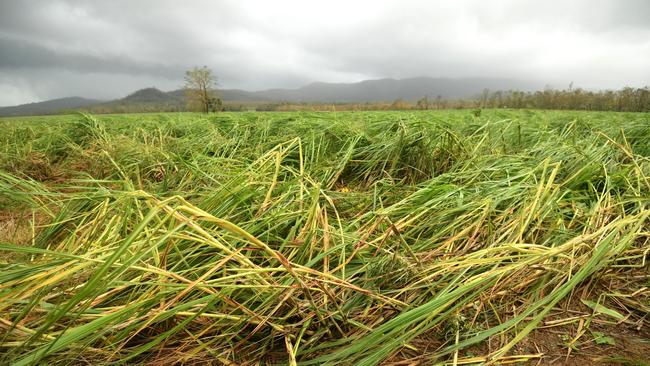Cyclone Debbie drag on first-half economic growth
The cyclone that hit Queensland could serve as a brake on first-half economic growth and spark inflation.

The devastating tropical cyclone that hit Queensland could serve as a brake on Australia’s first-half economic growth and spark a breakout of inflation given much of the crops in a key growing area has been “obliterated”.
While insurance payouts could top hundreds of millions of dollars, the overall economic impact is expect to be less intense than the destructive Tropical Cyclone Yasi in 2011.
The true extent of the devastation wreaked by Cyclone Debbie will become clearer in coming weeks, but it is already clear coal production will slow and vegetable and fruit supply will take a hit. The area impacted by the cyclone produces more than $1 billion worth of agricultural crops each year, with sugar, tomato and capsicum production particularly hampered given near-term harvesting dates.
“At this early stage, it’s clear severe damage has been inflicted on vegetable and fruit crops in the Bowen and Mackay areas, as well as considerable damage to this year’s sugar crop, which was due to be harvested in May,” said Commonwealth Bank senior economist John Peters.
“Initial reports suggest that a large portion of the crops in the Bowen ‘food bowl’ has been obliterated. This region provides about 95 per cent of Australia’s winter supply of tomatoes and capsicums.”
Produce from the region was due for harvesting within the next six weeks. Local supplies of eggplant, cucumber, beans and corn are also tipped to face issues given the prevalence of such crops in the region. The last major cyclone to hit Queensland was Yasi in 2011, which slashed local banana supplies by 75 per cent. In response, banana prices shot up to $15 a kilogram, from $3-$4 a kilogram in the lead-up to the disaster, and contributed to a 0.25 per cent lift in the headline inflation rate.
On this occasion the banana crop up north has been spared and given its high weighting in the consumer price index, official inflation rates may not rise as much as was seen post-Yasi.
“Cyclone Debbie will add to headline inflation in the March and June quarters. The size of that impact is yet to be assessed but it is highly unlikely that the 0.25 percentage-point contribution to headline CPI in the first quarter of 2011 in wake of Yasi will be repeated this cyclone around,” Mr Peters said.
“The 2011 (inflation rise) was caused mainly by the sharp spike in banana prices, which carry a larger weighting in the CPI than tomatoes and capsicums. While the upward pressure in fruit and vegetable prices is inevitable, it is likely to be much less than in Yasi’s wake.” Even so, Mr Peters said there would be “zero ramifications” for monetary policy, with the RBA to look through temporary factors in the setting of the interest rate.
The Whitsundays area that felt the full brunt of nature’s force this week represents about 10 per cent of local tourism dollars, while a core part of the nation’s coal production has been halted by the storm. In 2011, Yasi was seen to slice $7bn — or 2.25 percentage points — from gross state product in Queensland.
“At first flush, the negative impact of Cyclone Debbie on economic growth appears to be much more moderate than Yasi’s significant impact and hence the deleterious impact on Queensland GSP and Australia’s GDP will be well short of the impact in 2011,” Mr Peters said.
Standard & Poor’s said insurers were likely to be spared any credit ratings impact from Cyclone Debbie in light of their robust reinsurance arrangements.
Suncorp would be the most heavily exposed, although its reinsurance policies were expected to fully offset all claims.


